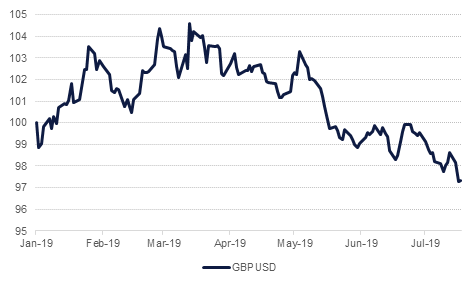.jpg?h=457&w=800&la=en&hash=64BEA913053595750AB4DA6D0839C009)
Sterling collapsed overnight, falling below 1.24 against the dollar at one point, as the market fixated on slowing job growth and a hardening stance from both Conservative party candidates on the Irish backstop component of the Brexit deal. Beyond the slowdown in job creation—with just 28k jobs created in the three months to May—other employment indicators from the UK continued to hold strong. The rolling 3-month unemployment rate held at 3.8% in the three months to May, the same level it has been in the last three prints. Meanwhile, wage growth ex-bonuses rose to 3.6% y/y from 3.4% previously and better than market expectations. Given that unemployment is at multi-decade lows the pace of job creation will naturally show some slowdown.
Retail sales in the US surprised on the upside in June with headline m/m growth of 0.4% and core growth of 0.7%. Core retail sales have been performing well in the past few months as labour market strength supports private consumption. Elsewhere in the economy, US industrial production growth held steady at 0.4% m/m as mild weather conditions dampened utility output while car production rose nearly 3%.
Unemployment in Turkey fell to 13% in the three months up to May from more than 14% in the prior reading. The improvement in unemployment is partly down to a smaller workforce as well as some signs of improvement in the economy: industrial production fell by just 1.3% y/y in May, less than markets had been expecting. Nevertheless, Turkey remains at risk of US sanctions thanks to the purchase and delivery of a Russian missile system. If sanctions are imposed, Turkey’s domestic arms industry could be directly affected, posing a risk for employment levels later on this year.
Pakistan’s central bank raised interest rates by 100bps to 13.25% as the country grapples with significant inflationary pressures. In its latest print for June, inflation in Pakistan hit 8.9% y/y, a slight slowdown from a recent peak of 9.4% in March but substantially higher than year ago levels. Earlier this month the IMF agreed to provide an Extended Fund Facility of around USD 6bn to Pakistan to help the country with short-term financing.
 Source: Bloomberg, Emirates NBD Research, Note: Jan 1 2019 =100
Source: Bloomberg, Emirates NBD Research, Note: Jan 1 2019 =100
Treasuries traded lower amid strong economic data from the US. This was despite comments from Fed officials that a ‘tactical adjustment’ lower in rates may be warranted. Further, Donald Trump said that he could impose additional tariffs on Chinese imports if he wanted to. Yields on the 2y UST, 5y UST and 10y UST closed at 1.84% (+2 bps), 1.86% (+2 bps) and 2.10% (+2 bps) respectively.
Regional bonds continued their positive move. The YTW on Bloomberg Barclays GCC Credit and High Yield index dropped -2 bps to 3.47% and credit spreads tightened further by 5 bps to 148 bps.
Dubai Aerospace is looking to raise USD 300mn in a 7y term loan and has already mandated banks for the same.
The dollar was buoyant yesterday posting fresh highs versus the euro, sterling and some other currencies. The EUR declined as weak German ZEW investor confidence reading added to pressure, while GBP also underperformed despite stronger than expected UK wages data, which was offset by a rise in jobless claims. Brexit-related uncertainty and political developments that have increased the odds for a no-deal exit continue to weigh on the pound. Cable reached a 27-month low at 1.2385, and EURGBP rose to a fresh six-month high at 0.9047.
Developed market equities closed mixed as earnings came in mixed. The S&P 500 index and the Euro Stoxx 600 index ended the dat -0.3% and +0.4% respectively.
Regional equities closed in positive territory as investors continued to add positions in market heavyweights ahead of earnings. The DFM index and the Tadawul gained +0.3% each.
Oil prices sank as inventory data from the API fell short of market expectations. Brent futures fell by 3.2% to USD 64.35/b while WTI ended the day at USD 57.62/b, a decline of 3.3%. Forward curves in both contracts weakened slightly at the fron of the curve while longer dated spreads slipped from recent highs: Dec 19/20 spreads in WTI have moved back below a USD 3/b backwardation this morning.
The API reported a draw in US inventories of 1.4m bbl last week, around half of what the market had been looking for while there were muted declines in gasoline and a large build in middle distillate stocks. EIA data is out later today which may confirm the soft tone to markets.
Click here to Download Full article